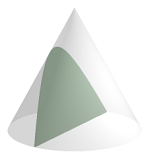Parabola
Pronunciation: /pərˈæ.bə.lə/ Explain
A parabola is the shape made when graphing a quadratic equation. A parabola can also be described as a conic section formed by intersecting a right circular conic surface with a plane parallel to the generator of the cone. A parabola can also be defined as all points in a plane equidistant from a line, called the directrix, and a point, called the focus, not on the line. Every parabola also has a vertex and a axis of symmetry. |
Parts of a Parabola
The vertex of a parabola is at the inflection point of the parabola. The inflection point is the point where the parabolic curve changes direction. In manipulative 2, the vertex is hot pink. The vertex can not be dragged in this manipulative, because the vertex is dependent upon the focus and directrix. The distance from the focus to any point on the parabola is the same as the distance from that point to the directrix. |
Conic Section Equation for Parabolas
The conic section form of a parabolic equation is Ax2 + Bxy + Cy2 + Dx + Ey + F = 0 where B2 = 4AC and either A ≠ 0 or C ≠ 0. This form allows one to draw parabolas where the directrix is not parallel to the x-axis or y-axis. The sliders in manipulative 6 allow you to change the figure. Note that for some values of A through F, the parabola will be out of the display area of the graph. Also, both A and C must be either negative or positive or the equation is undefined. |
Parabolas in the Physical World
The best known physical example of a parabola is a ball in free flight. Once the baseball leaves contact with the bat, the trajectory of a baseball hit by a batter closely follows a parabolic path. Another example, shown in figure 2, is a basketball bouncing on a hard floor. Each bounce approximates a parabola. The physical factors that keep it from being a perfect parabola are the deformation of the ball during the bounce and air resistance.
A lesser known example of a parabola is a rotating liquid. Figure 3 shows a rotating liquid with the interior of the parabola colored orange. |
Parabolic Reflector
Another common use of a parabola is a parabolic reflector, used in automobile headlights, flashlights and spotlights, also called searchlights. Figure 3 shows the focused beam a flashlight produces using a parabolic reflector.
When light reflects from a surface, the angle of reflection is twice the angle between the light ray and the normal to the surface. Manipulative 4 shows a blue line that is normal to the surface of the parabola, and how the light beam, shown in green, would reflect off of the surface. Click on the red point on the directrix and the purple focus to change the image. Discovery
|
References
- McAdams, David E.. All Math Words Dictionary, parabola. 2nd Classroom edition 20150108-4799968. pg 134. Life is a Story Problem LLC. January 8, 2015. Buy the book
Cite this article as:
McAdams, David E. Parabola. 4/27/2019. All Math Words Encyclopedia. Life is a Story Problem LLC. https://www.allmathwords.org/en/p/parabola.html.Image Credits
- All images and manipulatives are by David McAdams unless otherwise stated. All images by David McAdams are Copyright © Life is a Story Problem LLC and are licensed under a Creative Commons Attribution-ShareAlike 4.0 International License.
- Parabola from a conic section.: Marcelo Reis, https://en.wikipedia.org. This file is licensed under the Creative Commons Attribution-Share Alike 3.0 Unported license. https://en.wikipedia.org/wiki/File:Conicas2.PNG.
- A bouncing ball captured with a stroboscopic flash at 25 images per second.: Michael Maggs, https://en.wikipedia.org. This file is licensed under the Creative Commons Attribution-Share Alike 3.0 Unported license. https://en.wikipedia.org/wiki/File:Bouncing_ball_strobe_edit.jpg.
- A rotating liquid approximates a paraboloid: Matthew Trump, https://en.wikipedia.org. This file is licensed under the Creative Commons Attribution-Share Alike 3.0 Unported license. https://en.wikipedia.org/wiki/File:Coriolis_effect11.jpg.
- A flashlight throwing a focused beam.: Joema, https://en.wikipedia.org. This work has been released into the public domain by its author. https://en.wikipedia.org/wiki/File:SurefireU2JPG.jpg.
Revision History
4/27/2019: Changed equations and expressions to new format. (McAdams, David E.)12/21/2018: Reviewed and corrected IPA pronunication. (McAdams, David E.)
12/1/2018: Removed broken links, updated license, implemented new markup, updated geogebra app. (McAdams, David E.)
8/7/2018: Changed vocabulary links to WORDLINK format. (McAdams, David E.)
1/7/2010: Added "References". (McAdams, David E.)
2/10/2009: Simplified primary definition. (McAdams, David E.)
10/13/2008: Initial version. (McAdams, David E.)
- Navigation
- Home
- Contents
-
# A B C D E F G H I J K L M N O P Q R S T U V W X Y Z - Teacher Aids
- Classroom Demos
- How To
- LIASP
- LIASP Home
- Conditions of Use
- Privacy Policy
- Donate to LIASP
- Help build this site
- About LIASP
- Contact LIASP
All Math Words Encyclopedia is a service of
Life is a Story Problem LLC.
Copyright © 2018 Life is a Story Problem LLC. All rights reserved.
This work is licensed under a Creative Commons Attribution-ShareAlike 4.0 International License



